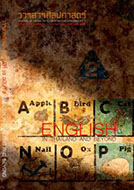An Evolutionary View of the Life Span of Obsolete English Words
Main Article Content
บทคัดย่อ
Language change in a living language is inevitable, and in this paper it is assumed that changes in a language are not purely random and are sometimes subject to selective pressure. Therefore this paper follows an evolutionary approach to studying language change. This paper does not challenge or offer ideas on how language first evolved, but explores some of the ways in which language is evolving, by using a representative sample of obsolete words taken from the Oxford English Dictionary (2nd edition), and analysing the life span of those words using an evolutionary theory framework. Ideas from Darwin of evolution by natural selection are borrowed and interpreted liberally throughout, particularly that of fitness. The manner of evolution between biological organisms and languages is notably different, but the fact that adaptation exists in both worlds makes the two worthy of analogous comparison. This paper is a study of the life span of obsolete words, and it is hoped that this will reveal a structured, or at least logical, evolution over time. By extension the patterns revealed may go some way towards creating a predictive theory of lexical life span.
การเปลี่ยนแปลงของภาษาที่ยังมีชีวิตอยู่นั้นเป็นสิ่งที่หลีกเลี่ยงไม่ได้ ไม่ใช่สิ่ง บังเอิญ และขึ้นอยู่กับแรงกดดันจากกระบวนการคัดสรรในลักษณะต่างๆ ด้วยเหตุ นี้บทความนี้จึงใช้แนวทางวิเคราะห์ตามมุมมองทางวิวัฒนาการเพื่อศึกษาการ เปลี่ยนแปลงของภาษา โดยได้สำรวจลักษณะการวิวัฒนาการของภาษาในด้าน ต่างๆ โดยใช้คำศัพท์ล้าสมัยในภาษาอังกฤษเป็นกลุ่มตัวอย่างและวิเคราะห์อายุขัย คำศัพท์เหล่านั้น ทั้งนี้ได้นำทฤษฎีวิวัฒนาการของดาร์วินมาประยุกต์ใช้เพื่อการ วิเคราะห์อย่างเต็มที่ โดยเฉพาะแนวคิดเรื่องความเหมาะสมในการอยู่รอด


